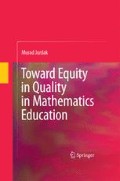The activity system at the national level is linked to the school activity system by a nested hierarchical relationship. In fact, the school activity system itself is nested within the national system and acts as ‘subject’ in it. This inclusive hierarchical relationship between the two systems implies that the national system affects the school system and is affected by it, though to a lesser degree. As in the school activity system, the object of the math education activity in the national context is the learning of math. However, in the national system, ‘school’ plays the role of ‘subject’ (compared to ‘student’ in the school system) within the community of the schools of a country (compared to ‘school community’).
Access this chapter
Tax calculation will be finalised at checkout
Purchases are for personal use only
Preview
Unable to display preview. Download preview PDF.
References
Astiz, M. et al. (2002). Slouching towards decentralization: Consequences of globalization for curricular control in national education systems. Comparative Education Review, 46, 66–88.
Bankov, K. et al. (2006). Assessing between-school variation in educational resources and mathematics and science achievement in Bulgaria. Prospects: Quarterly Review of Comparative Education, 36, 447–473.
Darling-Hammond, L. et al. (2003). Building instructional quality: ̋inside-out̏ and ̋outside-in̏ perspectives on San Diego’s school reform. Center for the Study of Teaching and Policy: A research report. ERIC document (ED499088).
Desmond, C. (2002). The politics of privatization and decentralization in global school reform: The value of equity claims for neoliberalism at the World Bank and in El Salvador ERIC document no. ED468518.
Hook W., Bishop W., & Hook, J. (2007). A quality math curriculum in support of effective teaching for elementary schools. Educational Studies in Mathematics, 65, 125–148.
Jurdak, M. E. (1989). Religion and language as culture carriers and barriers in mathematics education. In C. Kietel (Ed.), Mathematics, education and society (science and technology education, Document Series No. 35) (pp. 12–14). Paris: UNESCO.
Marks, G. (2006). Are between- and within-school differences in student performance largely due to socioeconomic background? Evidence from 30 countries. Educational Research, 48, 21–40.
Ma, X., & Klinger, D. (2000). Hierarchical linear modelling of student and school effects on academic achievement. Canadian Journal of Education, 25, 41–55.
Opdenakkar, J. et al. (2002). The effects of schools and classes on mathematics achievement. School Effectiveness & School Improvement, 13, 399–427.
PISA. (2005). School factors related to quality and equity: Results from PISA 2000. OECD Publishing.
Author information
Authors and Affiliations
Corresponding author
Rights and permissions
Copyright information
© 2009 Springer-Verlag US
About this chapter
Cite this chapter
Jurdak, M. (2009). The National Context. In: Toward Equity in Quality in Mathematics Education. Springer, Boston, MA. https://doi.org/10.1007/978-1-4419-0558-1_5
Download citation
DOI: https://doi.org/10.1007/978-1-4419-0558-1_5
Published:
Publisher Name: Springer, Boston, MA
Print ISBN: 978-1-4419-0557-4
Online ISBN: 978-1-4419-0558-1
eBook Packages: Humanities, Social Sciences and LawEducation (R0)

